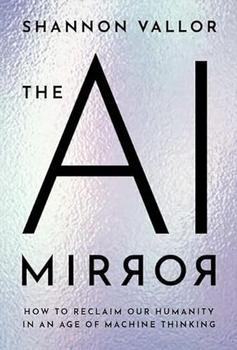
How to Reclaim Our Humanity in an Age of Machine Thinking
by Shannon Vallor
For many, technology offers hope for the future―that promise of shared human flourishing and liberation that always seems to elude our species. Artificial intelligence (AI) technologies spark this hope in a particular way.
They promise a future in which human limits and frailties are finally overcome―not by us, but by our machines.
Yet rather than open new futures, today's powerful AI technologies reproduce the past. Forged from oceans of our data into immensely powerful but flawed mirrors, they reflect the same errors, biases, and failures of wisdom that we strive to escape. Our new digital mirrors point backward. They show only where the data say that we have already been, never where we might venture together for the first time.
To meet today's grave challenges to our species and our planet, we will need something new from AI, and from ourselves.
Shannon Vallor makes a wide-ranging, prophetic, and philosophical case for what AI could be: a way to reclaim our human potential for moral and intellectual growth, rather than lose ourselves in mirrors of the past. Rejecting prophecies of doom, she encourages us to pursue technology that helps us recover our sense of the possible, and with it the confidence and courage to repair a broken world. Vallor calls us to rethink what AI is and can be, and what we want to be with it.
"[A] mind-bending treatise...[and] a fresh and fascinating take on the perils and promises of a much-debated technology." ―Publishers Weekly (starred review)
"Vallor knocks it out of the park with her sharp observations, apt metaphor, and surprisingly powerful call to action. Written with wit and charm, this book is a must-read for anyone interested in AI and our collective future." ―Kate Darling, MIT research scientist and author of The New Breed
"The AI Mirror is the nuanced, introspective signal we need to cut through all the noise about artificial intelligence. Shannon Vallor is one of the most important voices we have to help us parse fantasy from reality when it comes to understanding the true threat that AI poses to humans: making us forget what it means to be human at all. This is one of the most important and poetic books we can read right now to find our way through the AI-hype headlines." ―Safiya Umoja Noble, author of Algorithms of Oppression
"Shannon Vallor has written the book I've been waiting for. The AI Mirror delivers a powerful reframing of the future of humanity and artificial intelligence. Vallor offers a brilliant and original perspective on how AI can reflect our noblest values and aspirations, as well as our worst fears and flaws. She challenges us to rethink our relationship with AI, not as a threatening technology or a neutral set of new tools, but as a mirror that reveals who we are and aspire to be. AI Mirror is a captivating and insightful book that will inspire readers to think differently about the dangers and opportunities of AI. This is a must-read for anyone who cares about what happens to humanity as we push our long-standing relationship to technologies to new places." ―Mary L. Gray, co-author of Ghost Work: How to Stop Silicon Valley from Building a New Global Underclass
This information about The AI Mirror was first featured
in "The BookBrowse Review" - BookBrowse's membership magazine, and in our weekly "Publishing This Week" newsletter. Publication information is for the USA, and (unless stated otherwise) represents the first print edition. The reviews are necessarily limited to those that were available to us ahead of publication. If you are the publisher or author and feel that they do not properly reflect the range of media opinion now available, send us a message with the mainstream reviews that you would like to see added.
Any "Author Information" displayed below reflects the author's biography at the time this particular book was published.
Shannon Vallor is the Baillie Gifford Professor in the Ethics of Data and Artificial Intelligence in the Department of Philosophy at the University of Edinburgh, where she directs the Centre for Technomoral Futures in the Edinburgh Futures Institute. She is a Fellow of the Alan Turing Institute and former AI Ethicist at Google. Her work explores how new technologies reshape human moral and intellectual character and includes advising government and industry on the ethical design and use of AI. She is the author of Technology and the Virtues: A Philosophical Guide to a Future Worth Wanting (Oxford, 2016).
It is a fact of life that any discourse...will always please if it is five minutes shorter than people expect
Click Here to find out who said this, as well as discovering other famous literary quotes!
Your guide toexceptional books
BookBrowse seeks out and recommends the best in contemporary fiction and nonfiction—books that not only engage and entertain but also deepen our understanding of ourselves and the world around us.